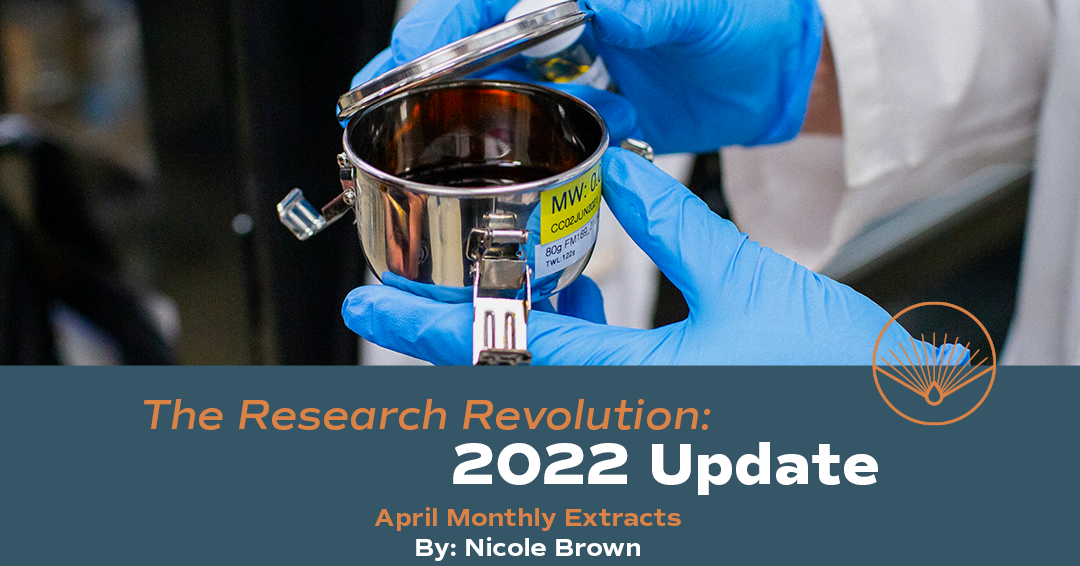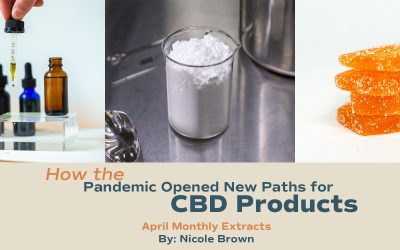Author: Nicole Brown
May 10, 2022 – 8 min read
In our featured editorial in June 2021, The Research Revolution: The Past Is Prologue, we shared our plans to accelerate safety, efficacy, and application research, in support of the overall advancement of the market from the “one-cannabinoid-fits-all stage” to a higher ground of the industry defined by research-backed formulations to deliver select effects for specific indications.
Now, less than a year later, we are excited to update you on the progress of our various research efforts, as well as provide key results, and what they mean for us all.
SAFETY & TOXICOLOGY RESEARCH
Safety is the foundation for this market. In 2021, OBX participated in large-scale human safety studies with Valdicare as well as the European Industrial Hemp Association’s (EIHA) Novel Food Consortium, to provide the FDA and the UK and European Union member states (respectively) with much-needed CBD safety data to support safe and ready access to cannabinoid-based products.
Later in 2021, OBX selected AIBMR (and Toxicoop in Hungary) to conduct Phase I and II toxicology studies as follows:
- Phase I for CBG, CBC, CBN
- OECD 407 Repeated Dose 14-Day Oral Toxicity Study in Rodents
- OECD 471 Bacterial Reverse Mutation Test
- OECD 473 In Vitro Mammalian Chromosomal Aberration Test
- OECD 474 Mammalian Erythrocyte Micronucleus Test
- Phase II preparation underway for CBG, CBC, and CBN
- Phase I preparation underway for CBDV, THCV, and a blended formulation of CBD, CBG, CBN, CBC, CBDV, and THCV
In April 2022, we announced the completion of phase one of the toxicology and safety results for the cannabinoid ingredients cannabigerol (CBG), cannabinol (CBN), and cannabichromene (CBC). The investment in this toxicological assessment demonstrates our commitment in furthering the science behind cannabinoid ingredients.
Summary
The results of the array of toxicology and safety assessments are promising. The results of the Oral Toxicity Study in Rodents show CBC, CBG, and CBN Isolates to have No Observed Adverse Effect Level (NOAEL) at the highest dosing group of 125 milligram/kilogram and body weight/day (approximates to a daily dose of 87.5mg) in both male and female specimens. Additionally, no mortality events occurred and there were no abnormal findings in the clinical observations, body weight and weight gain, hematology, gross pathology, and histopathology. This is important because existing literature has cited CBD as having negative histopathology and liver enlargement.
The Bacterial Reverse Mutation, or AMES Test results, show CBC, CBG, and CBN Isolates do not demonstrate any mutagenic activity on the applied bacterium strains utilized in this assay. Why is this important? Mutagenicity is described as a mutation of genetic material and can be used as a predictor of the long-term health effect to humans. Genetic mutations can lead to certain types of cancers. The results showing no mutagenic activity are positive because it implies CBC, CBN, and CBG Isolates will not cause genetic mutations.
The in-vitro mammalian chromosomal aberration test resulted in CBC, CBG, and CBN Isolates to be non-clastogenic. Why is this important? This means the Isolates would not lead to or induce disruption or cleavage of chromosomes.
The mammalian erythrocyte micronucleus test resulted in CBC, CBG, and CBN do not demonstrate any genotoxic activity. Why is this important? There is minimal potential for a mutation to cause cell death in the organism.
Interpretation
The results of these toxicology and safety studies indicate CBC, CBG, and CBN Isolates to be safe to include in foods and dietary supplements.
Next Steps
While the results are promising and indicative of the overall safety profile of these minor cannabinoids, OBX has committed future investment in OECD 408 Repeated Dose 90-day Oral Toxicity Study in Rodents. The significance of this phase of toxicological studies is evaluating the sub-chronic and chronic toxicity in the test substances. OBX expects the results of the 90-day oral toxicity study to further support the toxicological and safety profile of these cannabinoid isolates and enable sophisticated regulatory submissions such as Generally Recognized as Safe (GRAS) Independent conclusion or New Dietary Ingredient (NDI) application.
EFFICACY RESEARCH
Consumers want products that work. The market is graduating from it’s one-size-fits-all approach to cannabinoids and is demanding function-specific therapeutics that focus on anxiety, pain, sleep, women’s health, and skin conditions. As a company, OBX has made it to “base camp” with the broadest portfolio of pure, cGMP-certified cannabinoid products, and we’ve begun our summit push to need-state focused, R&D backed, proprietary formulations.
In direct support of the objective to develop a portfolio of research-backed proprietary formulations, we established an alliance with Radicle Science, a transformative healthtech B-corp validating natural products for the first time, to advance the development of market-leading, scientifically validated CBD and cannabinoid products, pursuing efficacy studies using in-home user testing across large numbers of participants.
Study Design:
- 6 arm studies, 1,800 users (6 cohorts of 300 users)
- 30 days
Studies:
- Joint Health: Completed March 2022
- Sleep: In Process, Completing May 2022
- Focus: In Development for July 2022
Joint Health: Completed March 2022
The primary aim of the study was to compare the pain alleviating effects of different cannabinoid formulations
(which all contained CBD) to CBD isolate (i.e., a formulation using substantially pure CBD and no other active
ingredients). There were 6 arms total within the study, with each arm containing varying levels of minor cannabinoids (including cannabidiol (CBD), cannabigerol (CBG), cannabichromene (CBC).
All the product formulations in this study led to significant improvements in pain, anxiety, sleep disturbance and quality of life. Initial takeaways include:
- Data indicates that cannabinoid based products need a full month of daily use before delivering optimal results.
- Nearly half (44.8%) of participants who received any of the products experienced a clinically meaningful improvement in their pain.
Acne & Skincare
In addition to the above studies leveraging the Radicle Science platform, OBX has further partnered with a team of dermatologists, to assess the clinical efficacy of several topical cannabinoid formulations for acne, along with the sebum control benefits of several topical cannabinoid formulations.
Study Design:
- 3 arm study, 30 users (3 cohorts of 10 users)
- 30 days
Formulas:
The subjects will be randomized to one of 3 product arms:
- Vehicle alone
- THCV: 10mg D9 THCV
- THCV-Zpods: 10mg D9 THCV
Start and End Date: Starting May 2022
EXPLORATORY RESEARCH
Can cannabinoids help treat depression, Alzeimers, cancer, or metabolic disorders? University researchers with labs and teams focused on specific diseases are excited to find out, and we at OBX are excited to arm them with a cannabinoid care package for early in vitro testing and analysis. There is a growing group of researchers across the globe that are excited to test cannabinoids against their fields’ most challenging problems but have had challenges gaining reliable access to consistent, pure, cannabinoid inputs. OBX is excited to remove this blocker to unlock the exploratory and applied research that has been limited due to input scarcity and compliance concerns.
Case Western Reserve University
- Dr. Paul Tesar, sponsor scientist, will assess the potential of pure cannabinoid isolates and precise ratios of specific cannabinoids in formulations, to understand the impact of cannabinoids on brain cell functions, with a focus on neuroinflammation.
Harvard University
- Dr. Staci Gruber, sponsor scientist, will assess the potential of precise ratios of specific cannabinoids in formulations, to understand the impact of cannabinoids on psychiatric conditions including Alzheimer’s, dementia, bipolar disorder, and depression.
FAMU
- Dr. Mandip Sachdeva, sponsor scientist, will explore the therapeutic potential of specific compounds in selected disease models, including an evaluation of the impact of compounds on the reduction of cancerous tumor growth, chemotherapy induced neuropathy and diabetes induced neuropathy.
Last month, Dr. Sachdeva and his team published their findings, along with the full report, Role of Cannabidiol and Tetrahydrocannabivarin on Paclitaxel-induced Neuropathic Pain in Rodents. The purpose of this study was to evaluate if phytocannabinoids, synthetic cannabidiol (CBD), and tetrahydrocannabivarin (THCV), and their combination, could protect mice from Paclitaxel-induced peripheral neuropathy (PIPN).
Key takeaways from the study included:
- THCV, when combined with CBD, provides excellent neuroprotection against paclitaxel-induced peripheral neuropathy in mice.
- THCV and CBD improve mitochondrial health and neuron function by modulating CB1 and 5HT1A receptors, respectively.
- After blocking CB1 and 5HT1A receptors in PTX-injured DRG primary cultures, THCV and CBD have no effect on neurite outgrowths, mitochondrial membrane potentials, or mitochondrial superoxide production.
Additional university partnerships include UC Boulder (focusing on outcomes to support depression & PTSD), the University of Sydney, UNAM and Tec de Monterrey.
CONSUMER INSIGHTS
In 2021, OBX launched an internal Consumer Insights platform, to provide organalopetic and efficacy feedback on pre-commercial products and formulations.
Size: 100 users
Median Age Range: 25 – 35
Through Consumer Insights, we are able to collect data to drive decisions regarding:
- Optimal cannabinoids dosage levels to deliver select-effects
- Optimal cannabinoid ratios and combinations in formulation to produce desired product outcomes
- Form factor comparisons to best combine the right formulation to the right form factor to deliver on desired outcomes
To date, we have tested a variety of distinct formulations and across a range of different form factors, including tinctures, gummies, sublinguals, and beverages. The data gathered through our consumer insights platform strengthens our formulation and product development intelligence, leveraging a data-driven approach to refine and revise formulations to make products that work.
CONCLUDING THOUGHTS
The natural products industry and consumers alike are eager for evidence-based health data, and we’re seeing this factor most prominently in the CBD and cannabis space. At OBX, we’re energized by this burgeoning movement to democratize scientific insights about natural products, which will, we firmly believe, lead to healthier lives.
We are further building a toolkit of various enhancements, modifying cannabinoids at the molecular level or combining cannabinoids with other active or inactive compounds to enhance potency, bioavailability, and stability, and enabling targeted delivery and controlled release – allowing us to make sophisticated products that deliver effective solutions to a variety of consumer need states and select-effects.
We are inviting cannabinoid product brands, researchers, labs, technologists, chemists to join in this movement – what we can accomplish together will be nothing short of transformative and has the power to completely redefine the industry.
Author: Nicole Brown
May 10, 2022 – 8 min read
In our featured editorial in June 2021, The Research Revolution: The Past Is Prologue, we shared our plans to accelerate safety, efficacy, and application research, in support of the overall advancement of the market from the “one-cannabinoid-fits-all stage” to a higher ground of the industry defined by research-backed formulations to deliver select effects for specific indications.
Now, less than a year later, we are excited to update you on the progress of our various research efforts, as well as provide key results, and what they mean for us all.
SAFETY & TOXICOLOGY RESEARCH
Safety is the foundation for this market. In 2021, OBX participated in large-scale human safety studies with Valdicare as well as the European Industrial Hemp Association’s (EIHA) Novel Food Consortium, to provide the FDA and the UK and European Union member states (respectively) with much-needed CBD safety data to support safe and ready access to cannabinoid-based products.
Later in 2021, OBX selected AIBMR (and Toxicoop in Hungary) to conduct Phase I and II toxicology studies as follows:
- Phase I for CBG, CBC, CBN
- OECD 407 Repeated Dose 14-Day Oral Toxicity Study in Rodents
- OECD 471 Bacterial Reverse Mutation Test
- OECD 473 In Vitro Mammalian Chromosomal Aberration Test
- OECD 474 Mammalian Erythrocyte Micronucleus Test
- Phase II preparation underway for CBG, CBC, and CBN
- Phase I preparation underway for CBDV, THCV, and a blended formulation of CBD, CBG, CBN, CBC, CBDV, and THCV
In April 2022, we announced the completion of phase one of the toxicology and safety results for the cannabinoid ingredients cannabigerol (CBG), cannabinol (CBN), and cannabichromene (CBC). The investment in this toxicological assessment demonstrates our commitment in furthering the science behind cannabinoid ingredients.
Summary
The results of the array of toxicology and safety assessments are promising. The results of the Oral Toxicity Study in Rodents show CBC, CBG, and CBN Isolates to have No Observed Adverse Effect Level (NOAEL) at the highest dosing group of 125 milligram/kilogram and body weight/day (approximates to a daily dose of 87.5mg) in both male and female specimens. Additionally, no mortality events occurred and there were no abnormal findings in the clinical observations, body weight and weight gain, hematology, gross pathology, and histopathology. This is important because existing literature has cited CBD as having negative histopathology and liver enlargement.
The Bacterial Reverse Mutation, or AMES Test results, show CBC, CBG, and CBN Isolates do not demonstrate any mutagenic activity on the applied bacterium strains utilized in this assay. Why is this important? Mutagenicity is described as a mutation of genetic material and can be used as a predictor of the long-term health effect to humans. Genetic mutations can lead to certain types of cancers. The results showing no mutagenic activity are positive because it implies CBC, CBN, and CBG Isolates will not cause genetic mutations.
The in-vitro mammalian chromosomal aberration test resulted in CBC, CBG, and CBN Isolates to be non-clastogenic. Why is this important? This means the Isolates would not lead to or induce disruption or cleavage of chromosomes.
The mammalian erythrocyte micronucleus test resulted in CBC, CBG, and CBN do not demonstrate any genotoxic activity. Why is this important? There is minimal potential for a mutation to cause cell death in the organism.
Interpretation
The results of these toxicology and safety studies indicate CBC, CBG, and CBN Isolates to be safe to include in foods and dietary supplements.
Next Steps
While the results are promising and indicative of the overall safety profile of these minor cannabinoids, OBX has committed future investment in OECD 408 Repeated Dose 90-day Oral Toxicity Study in Rodents. The significance of this phase of toxicological studies is evaluating the sub-chronic and chronic toxicity in the test substances. OBX expects the results of the 90-day oral toxicity study to further support the toxicological and safety profile of these cannabinoid isolates and enable sophisticated regulatory submissions such as Generally Recognized as Safe (GRAS) Independent conclusion or New Dietary Ingredient (NDI) application.
EFFICACY RESEARCH
Consumers want products that work. The market is graduating from it’s one-size-fits-all approach to cannabinoids and is demanding function-specific therapeutics that focus on anxiety, pain, sleep, women’s health, and skin conditions. As a company, OBX has made it to “base camp” with the broadest portfolio of pure, cGMP-certified cannabinoid products, and we’ve begun our summit push to need-state focused, R&D backed, proprietary formulations.
In direct support of the objective to develop a portfolio of research-backed proprietary formulations, we established an alliance with Radicle Science, a transformative healthtech B-corp validating natural products for the first time, to advance the development of market-leading, scientifically validated CBD and cannabinoid products, pursuing efficacy studies using in-home user testing across large numbers of participants.
Study Design:
- 6 arm studies, 1,800 users (6 cohorts of 300 users)
- 30 days
Studies:
- Joint Health: Completed March 2022
- Sleep: In Process, Completing May 2022
- Focus: In Development for July 2022
Joint Health: Completed March 2022
The primary aim of the study was to compare the pain alleviating effects of different cannabinoid formulations
(which all contained CBD) to CBD isolate (i.e., a formulation using substantially pure CBD and no other active
ingredients). There were 6 arms total within the study, with each arm containing varying levels of minor cannabinoids (including cannabidiol (CBD), cannabigerol (CBG), cannabichromene (CBC).
All the product formulations in this study led to significant improvements in pain, anxiety, sleep disturbance and quality of life. Initial takeaways include:
- Data indicates that cannabinoid based products need a full month of daily use before delivering optimal results.
- Nearly half (44.8%) of participants who received any of the products experienced a clinically meaningful improvement in their pain.
Acne & Skincare
In addition to the above studies leveraging the Radicle Science platform, OBX has further partnered with a team of dermatologists, to assess the clinical efficacy of several topical cannabinoid formulations for acne, along with the sebum control benefits of several topical cannabinoid formulations.
Study Design:
- 3 arm study, 30 users (3 cohorts of 10 users)
- 30 days
Formulas:
The subjects will be randomized to one of 3 product arms:
- Vehicle alone
- THCV: 10mg D9 THCV
- THCV-Zpods: 10mg D9 THCV
Start and End Date: Starting May 2022
EXPLORATORY RESEARCH
Can cannabinoids help treat depression, Alzeimers, cancer, or metabolic disorders? University researchers with labs and teams focused on specific diseases are excited to find out, and we at OBX are excited to arm them with a cannabinoid care package for early in vitro testing and analysis. There is a growing group of researchers across the globe that are excited to test cannabinoids against their fields’ most challenging problems but have had challenges gaining reliable access to consistent, pure, cannabinoid inputs. OBX is excited to remove this blocker to unlock the exploratory and applied research that has been limited due to input scarcity and compliance concerns.
Case Western Reserve University
- Dr. Paul Tesar, sponsor scientist, will assess the potential of pure cannabinoid isolates and precise ratios of specific cannabinoids in formulations, to understand the impact of cannabinoids on brain cell functions, with a focus on neuroinflammation.
Harvard University
- Dr. Staci Gruber, sponsor scientist, will assess the potential of precise ratios of specific cannabinoids in formulations, to understand the impact of cannabinoids on psychiatric conditions including Alzheimer’s, dementia, bipolar disorder, and depression.
FAMU
- Dr. Mandip Sachdeva, sponsor scientist, will explore the therapeutic potential of specific compounds in selected disease models, including an evaluation of the impact of compounds on the reduction of cancerous tumor growth, chemotherapy induced neuropathy and diabetes induced neuropathy.
Last month, Dr. Sachdeva and his team published their findings, along with the full report, Role of Cannabidiol and Tetrahydrocannabivarin on Paclitaxel-induced Neuropathic Pain in Rodents. The purpose of this study was to evaluate if phytocannabinoids, synthetic cannabidiol (CBD), and tetrahydrocannabivarin (THCV), and their combination, could protect mice from Paclitaxel-induced peripheral neuropathy (PIPN).
Key takeaways from the study included:
- THCV, when combined with CBD, provides excellent neuroprotection against paclitaxel-induced peripheral neuropathy in mice.
- THCV and CBD improve mitochondrial health and neuron function by modulating CB1 and 5HT1A receptors, respectively.
- After blocking CB1 and 5HT1A receptors in PTX-injured DRG primary cultures, THCV and CBD have no effect on neurite outgrowths, mitochondrial membrane potentials, or mitochondrial superoxide production.
Additional university partnerships include UC Boulder (focusing on outcomes to support depression & PTSD), the University of Sydney, UNAM and Tec de Monterrey.
CONSUMER INSIGHTS
In 2021, OBX launched an internal Consumer Insights platform, to provide organalopetic and efficacy feedback on pre-commercial products and formulations.
Size: 100 users
Median Age Range: 25 – 35
Through Consumer Insights, we are able to collect data to drive decisions regarding:
- Optimal cannabinoids dosage levels to deliver select-effects
- Optimal cannabinoid ratios and combinations in formulation to produce desired product outcomes
- Form factor comparisons to best combine the right formulation to the right form factor to deliver on desired outcomes
To date, we have tested a variety of distinct formulations and across a range of different form factors, including tinctures, gummies, sublinguals, and beverages. The data gathered through our consumer insights platform strengthens our formulation and product development intelligence, leveraging a data-driven approach to refine and revise formulations to make products that work.
CONCLUDING THOUGHTS
The natural products industry and consumers alike are eager for evidence-based health data, and we’re seeing this factor most prominently in the CBD and cannabis space. At OBX, we’re energized by this burgeoning movement to democratize scientific insights about natural products, which will, we firmly believe, lead to healthier lives.
We are further building a toolkit of various enhancements, modifying cannabinoids at the molecular level or combining cannabinoids with other active or inactive compounds to enhance potency, bioavailability, and stability, and enabling targeted delivery and controlled release – allowing us to make sophisticated products that deliver effective solutions to a variety of consumer need states and select-effects.
We are inviting cannabinoid product brands, researchers, labs, technologists, chemists to join in this movement – what we can accomplish together will be nothing short of transformative and has the power to completely redefine the industry.




